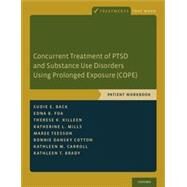Concurrent Treatment of PTSD and Substance Use Disorders Using Prolonged Exposure (COPE) Patient Workbook
, by Back, Sudie E.; Foa, Edna B.; Killeen, Therese K.; Mills, Katherine L.; Teesson, Maree; Cotton, Bonnie Dansky; Carroll, Kathleen M.; Brady, Kathleen T.- ISBN: 9780199334513 | 019933451X
- Cover: Paperback
- Copyright: 10/28/2014
Concurrent Treatment of PTSD and Substance Use Disorders Using Prolonged Exposure (COPE) is a cognitive-behavioral psychotherapy program designed for patients who have posttraumatic stress disorder (PTSD) and a co-occurring alcohol or drug use disorder. COPE represents an integration of two evidence-based treatments: Prolonged Exposure (PE) therapy for PTSD and Relapse Prevention for substance use disorders.
COPE is an integrated treatment, meaning that both the PTSD and substance use disorder are addressed concurrently in therapy by the same clinician, and patients can experience substantial reductions in both PTSD symptoms and substance use severity. Patients use the COPE Patient Workbook while their clinician uses the Therapist Guide to deliver treatment. The program is comprised of 12 individual, 60 to 90 minute therapy sessions. The program includes several components: information about how PTSD symptoms and substance use interact with one another; information about the most common reactions to trauma; techniques to help the patient manage cravings and thoughts about using alcohol or drugs; coping skills to help the patient prevent relapse to substances; a breathing retraining relaxation exercise; and in vivo (real life) and imaginal exposures to target the patient's PTSD symptoms.
COPE is an integrated treatment, meaning that both the PTSD and substance use disorder are addressed concurrently in therapy by the same clinician, and patients can experience substantial reductions in both PTSD symptoms and substance use severity. Patients use the COPE Patient Workbook while their clinician uses the Therapist Guide to deliver treatment. The program is comprised of 12 individual, 60 to 90 minute therapy sessions. The program includes several components: information about how PTSD symptoms and substance use interact with one another; information about the most common reactions to trauma; techniques to help the patient manage cravings and thoughts about using alcohol or drugs; coping skills to help the patient prevent relapse to substances; a breathing retraining relaxation exercise; and in vivo (real life) and imaginal exposures to target the patient's PTSD symptoms.







